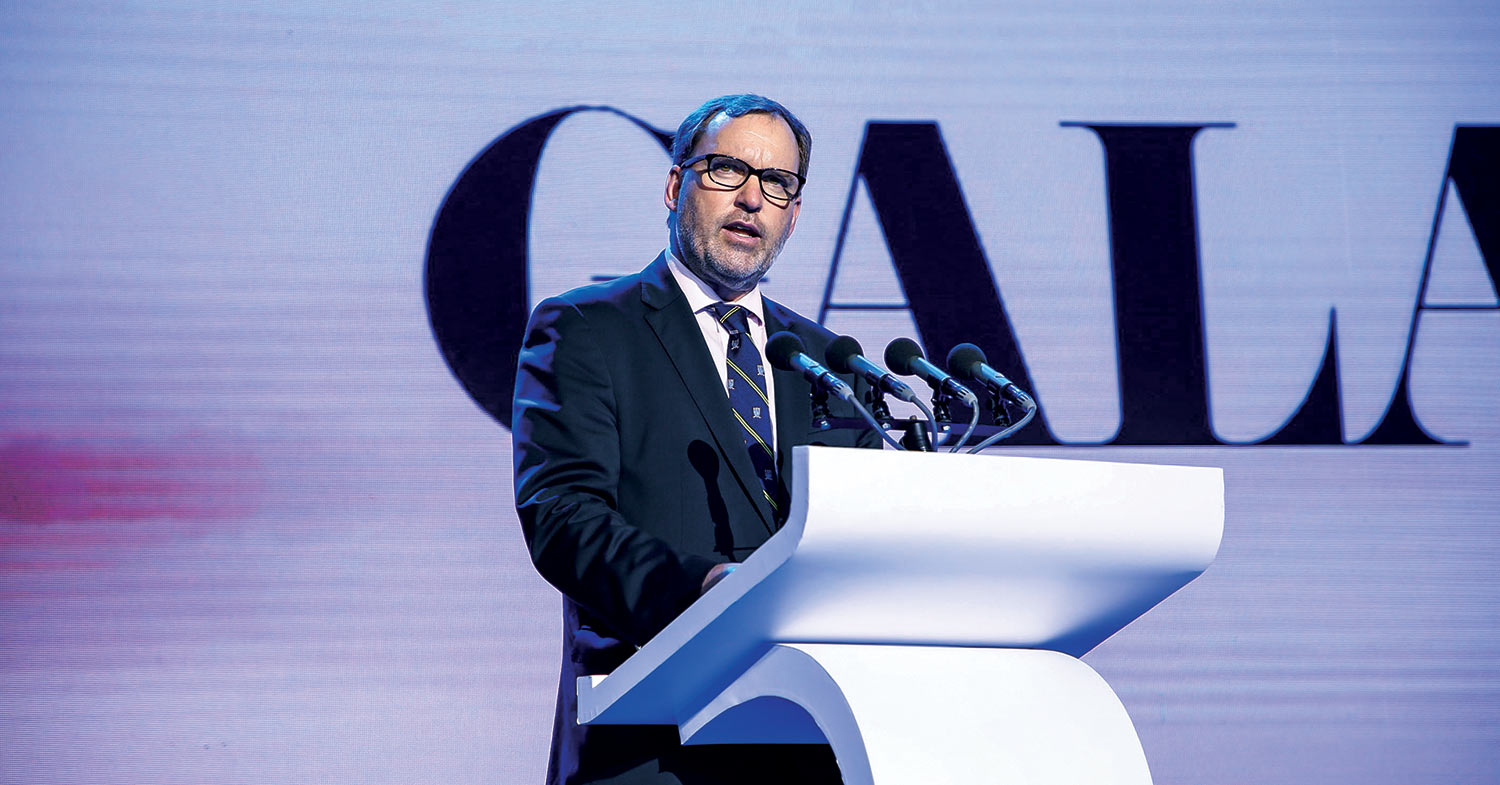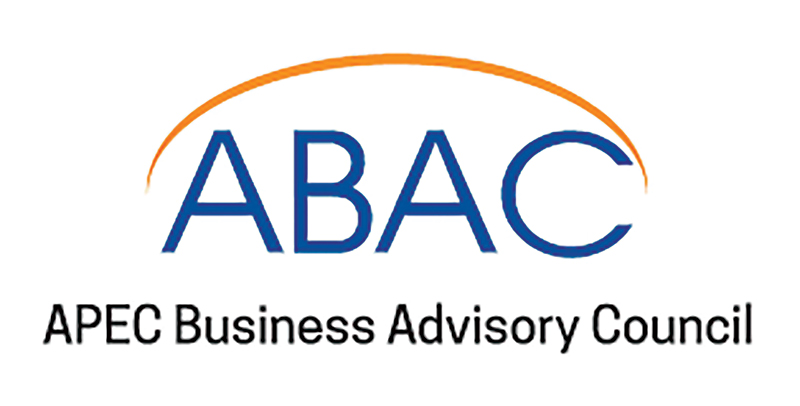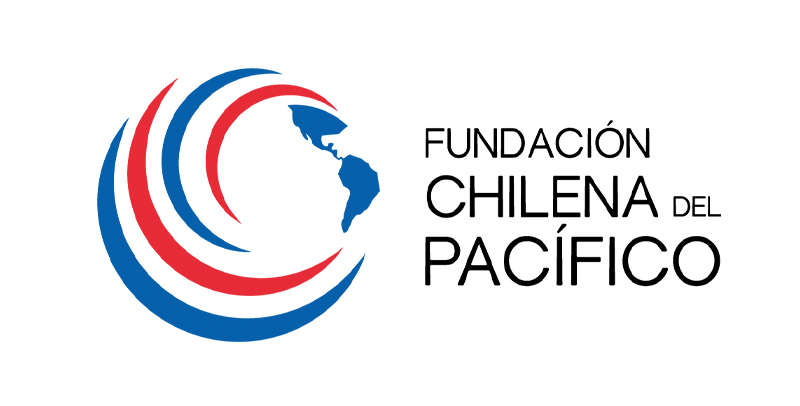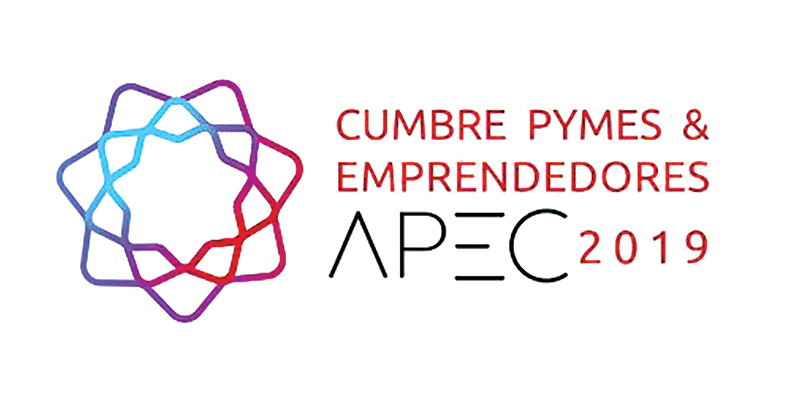ABAC
FEATURE
economy characterized by rapid change, an increasing degree of uncertainty as to the future of free trade and the labor market, and a number of opportunities associated with digitization, the need for international consensus building and understanding could not be more critical. It is crucial for every economy, large or small, to promote the benefits of free trade not only for economic reasons, but also to maintain permanent dialogue on common challenges and opportunities. The Asia Pacific Economic Cooperation forum (APEC) is one of the key institutions which enables this global collaboration to take place.
APEC is composed of 21 economies that collectively represent 40% of the world’s population and 60% of the world’s total GDP. Its core purpose is to facilitate the ideal environment for market players in the Asia Pacific region to reach consensus on principles related to free trade. Every year a new economy acts as the APEC host, and a series of events are held where different actors engage in dialogue.
ABAC is the private sector arm of APEC, and it acts as the voice of business in APEC. Each economy has six handpicked representatives sitting on ABAC, which makes it difficult to calculate time zones for conference calls, but also enriches the conversations we have and conclusions we draw.
At the end of every APEC year, ABAC members formally meet with the Leaders and deliver a series of recommendations. These recommendations are at the core of ABAC’s work agenda throughout the year and represent the most significant opportunity for ABAC to deliver a strong message to the Leaders of 21 economies who wield enormous influence.
After much robust debate and eventual consensus, ABAC has agreed on the key themes that form the basis of the letter containing its recommendations to the Leaders. These themes are at the top of the business agenda in the APEC region.

Chair of ABAC 2019
WTO: do not take it for granted
The current trade tensions between the two largest economies in the world and their impacts on the global economy concern all ABAC members, regardless of which economy they represent. We fear the most under-served and vulnerable communities will be the ones most affected by further deterioration of global trade environment.
The state of the World Trade Organization (WTO) is also a matter of great concern for us. The fundamental premise of the WTO system is to enforce rule and order in global trade so that economies can engage in the market on equal terms, and businesses and investors can be confident in the long term stability of the global market. It is urgent that we resolve the crisis in the WTO’s dispute settlement system – specifically, the impasse involving the appointment of members of the Appellate Body.
We also see a need to reform the rules to make sure that the WTO remains relevant and fit for purpose. These reforms should enable modern business models to flourish and ensure that women and MSMEs can access the opportunities and benefits of the global economy.
ABAC reaffirms its support for the WTO and the global rules-based order of trade. Without the WTO, which provides invaluable dispute resolution services among its other roles, markets will become less resilient and less dynamic. Trust in the global market will plummet, and all progress we have made in driving a seamless, globalized trade system will be undermined.
The bottom line is that we should not take the WTO for granted; in the current global environment it would be almost impossible to create a new organization with an equivalent mandate if the current one was to disappear. I believe this only highlights the need to continue with the critical work of deepening regional economic integration.
A vital challenge of our age
Climate change is a vital challenge of our age. This winter in Santiago, where I live, has been one of the warmest I can remember, which acts as a foreboding warning sign. Scientists recently pronounced July 2019 to be the hottest month that the world has seen since records began. The APEC region is facing rapidly rising tides, uninhabitable hot temperatures, fatal droughts, and dangerous storms.
The business community can playa real role in helping to develop innovative ideas on climate change and supporting the transition to a sustainable, resilient and low-carbon economy not only for current, but more importantly for future generations. In our Letter of Recommendations to Leaders at the end of the year we will urge Leaders to support the transition to a sustainable and low carbon economy.
There can be no argument that climate change is too expensive to address in the short term, because the long-term effects of climate change will be infinitely more devastating on the economy. Addressing climate change is also a matter of good business sense.
Cop 25, the United Nations´ annual conference on climate change, will take place in Santiago only weeks after Chile´s APEC Week concludes. In the past, international platforms to discuss business and to discuss environmental issues have had little interaction with one another. I think we urgently need to start thinking together about how we can all work as a team to tackle the climate crisis.
An enormous source of opportunities
Many would argue that the economy we operate in today is almost entirely a digital economy. I believe that APEC’s big businesses understand how to operate in the digital environment and how to take advantage of the opportunities that it brings, but many smaller market players are still excluded from these opportunities. At ABAC we support measures that encourage micro, small, and medium enterprises (MSMEs) to reach their full market potential in the digital economy.
I admire every business owner running an MSME. It takes an incredible amount of work to get a business idea off the ground and then to persevere with it day in, day out. MSMEs owners are so preoccupied with this daily running of business that they often don’t have the time, or the ability to make long-term investments, required to upskill themselves and to digitize their businesses. The digital economy is flexible and fast-paced, and we need to support MSMEs to keep up.
APEC commissioned a report by the University of Southern California Marshall School of Business which crystalized these concerns about the ability of MSMEs to thrive in the modern economy. While the report reiterated the importance of MSMEs in the APEC economy – indeed, it found that 97% of APEC businesses were MSMEs – it also found that leaders of MSMEs feel overwhelmingly disempowered to digitize their business models.
At the same time, this report offered a beacon of hope. It found that digital MSMEs experience twice the growth rate of that of non-digital MSMEs, and that supporting MSMEs to digitize their businesses is one of the most effective ways to promote long term stability and growth of MSMEs. ABAC is dedicated to advocating for policy institutions which allow MSMEs to leverage the digital economy.
Digitization is also an opportunity to boost gender equality in the economy. Women are chronically unrepresented in leadership positions in MSMEs and they have less access to the resources that can enable them to digitize their business models. The digital economy can be leveraged to boost the success of women in business. For MSMEs and entrepreneurs, and especially for women involved, digitization can be the gift that keeps on giving.
I am proud that ABAC’s recommendations to Leaders this year represent a shift in what is perceived as the traditional business agenda. At ABAC we are working for a more inclusive and sustainable world trade system.
In 2019, a year when we face the erosion of the sanctity of the WTO, the vital challenge of climate change, and a swift-moving digital economy, businesses and Leaders alike need to be bold and to act.




At APEC Business Advisory Council (ABAC), we are committed to encouraging the participation of MSMEs and entrepreneurs in the global economy. We believe that all market players should have access to importing and exporting, no matter how small.
In November, we invite MSMEs and entrepreneurs from all over the APEC region to participate in our APEC MSMEs and Entrepreneurs Summit. The program features formidable networking opportunities, tailor-made workshops and panels, and VIP guests.
At the Summit we will also launch Monde B2B Marketplace, a revolutionary digital platform that will give APEC enterprises unparalleled access to importing and exporting beyond national borders. With Monde B2B Marketplace, cross-border trade can be a reality for your enterprise. Participate in the 2019 APEC MSMEs and Entrepreneurs Summit (in person and via streaming) and sign up for the Monde B2B Marketplace. Overcome the challenges and take the opportunities!

